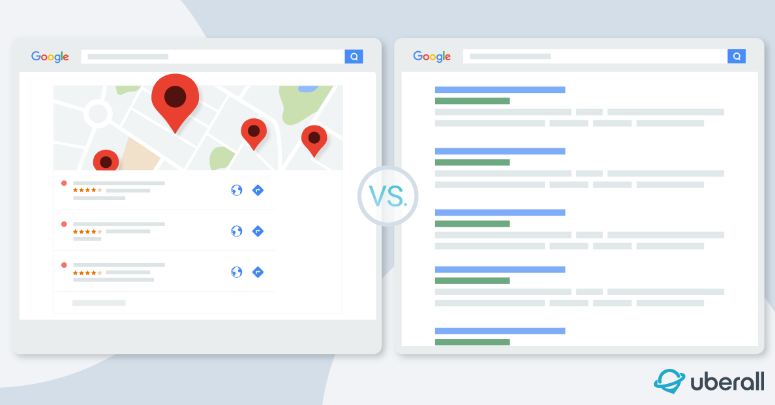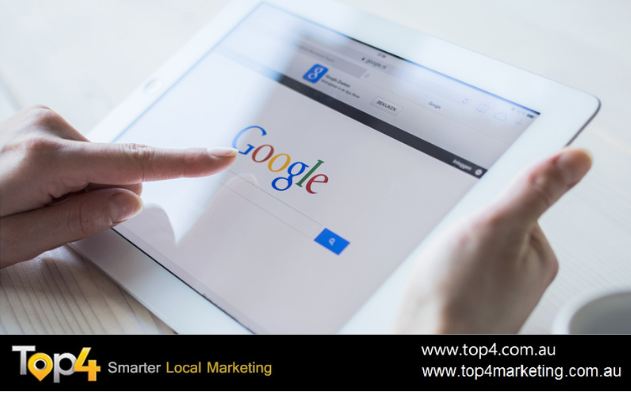
If you don’t know the difference between organic SEO and local SEO, don’t worry, you’re not alone. Most businesses have no idea that these are two different fields with different ranking factors and if you operate even one brick-and-mortar business location then you need to know the difference in order to be visible online.
What Is Organic SEO?
Organic SEO is the process by which businesses seek to improve their ranking on search engine results pages to drive targeted traffic to their website.
This is achieved by paying attention to website structure and creating content that matches the search intent of the user.
Building internal links between pages makes it easier for Google to crawl a website and group topics together. Receiving external links helps Google to determine the level of authority and trust that it should give to a page.
Since trust and relevance are still major factors for the user experience online, internal and external links are still highly important factors to consider when approaching your organic SEO.
Typical Ranking Factors for Organic SEO
Methods such as boosting keywords, backlinking and writing high-quality content can all improve a site’s search engine ranking.
Organic SEO Can Be Achieved by…
- Identifying who the target customer is
- Identifying what they are looking for/what problems they are trying to solve
- Matching customer problems with common keyword search queries and creating highly relevant content that addresses customer concerns
- Optimizing web pages with relevant content targeting search intent
- Building links (both internal and external)
- Incorporating meta-tags (used to specify how content should be displayed on search engines)
Benefits of Organic SEO
- Generates more targeted traffic to your website
- Ranking for queries that drive ‘good fit’ prospects to the business
- Users are more open to your ‘pitch’ because they found you
- Establishes your business as a thought leader in the industry
- Cheaper and often more effective than paid search (i.e. Google AdWords)
What Is Local SEO?
Local SEO is the process by which businesses seek to optimize their location visibility online for search queries that contain local intent.
It is primarily utilized by businesses that have brick-and-mortar locations to reach consumers who are searching for goods and services in that area.
Local search results are impacted by search queries that feature a geographical component such as ‘clothing store open now’ and ‘restaurants near me’. Even conducting simple searches like ‘cafes’ or ‘restaurants’ in Google will include 3 immediate local business results in that area (known as the local 3-pack).
Local SEO is also impacted by such factors as the review rating of a location and opening hours. If a user searches ‘best burgers near me’, ‘highest rated hotels in Prague’ or ‘top mechanic in my area’ a range of options will be displayed (based on rating) and the user can then filter the search by review score.
Typical Ranking Factors for Local SEO
Signals of relevance are built around a specific business location based on several factors such as citations, business listings, reviews and accuracy of your location information.
Local SEO Can Be Achieved by…
- Having a complete and accurate profile for each business location on Google My Business (GMB), Apple Maps and other relevant search and maps services
- Building links to your website (quantity and quality of links is a factor)
- Consistency and accuracy of business listings and citations on platforms such as Yelp, Facebook, Yellowpages, Bing and Apple Maps
- Managing reviews and providing customer feedback
Benefits of Local SEO
- Helps connect your business with ‘ready to buy’ customers searching for products/services your business provides in the location you provide it
- Increases foot traffic to stores
- Local search queries are more likely to end in a purchase than organic search queries
- Build local online visibility through listings, citations, and links
- Establish credibility through reviews
- Local search results appear above the organic search results
- Cheaper and can be more effective than paid search
What Do Local and Organic Search Results Look Like?
Included below is an example of a Google search engine results page. When a search is deemed locally relevant, a grid called the local 3-pack will appear above the organic results.
What’s the Difference?
The biggest difference between local and organic SEO is the intent of the user.
Organic Search Results
Search engines will seek out sites that have the most relevant and engaging content for each search query – these queries may or may not have location specific intent by the user.
Local Search Results
Search engines will seek out locations in proximity of the user that have the most relevant and accurate business information for that query.
By now, Google knows that when a user enters ‘pizza’ into the search bar, they are more than likely going to want to find a local pizza place near them…
Local SEO or Organic SEO: Which One Do You Need?
If you’re not trying to optimize a physical location for local search than the answer is obviously organic but the answer is both if you have even one location that is relevant for local search intent.
To reach more users on more devices, you should be aiming to incorporate a local SEO strategy into your existing organic SEO strategy.
Having an optimization strategy for both local and organic search is the best way to drive online and offline traffic to your business – this is why businesses with brick-and-mortar locations need to be targeting both.
Both forms of SEO will help drive traffic to your website and to your physical business locations but having a strategy for both means that you will be optimizing more accurately and effectively.
Developing a Marketing Strategy for Local and Organic Search
Target Local Search to Reach More Mobile Users
- Local search queries are made by consumers who are ready to make a purchase now – more than half of local searches end with a consumer visiting a store within 24 hours
- There has been 150% growth in searches containing the phrase ‘_ near me now’
Target Organic Search to Reach More Desktop Users
- Recent data from Jumpshot shows that mobile search users are clicking on organic results pages almost 50% less than in 2015
- Desktop users are still clicking on organic content at almost the same rate that they were two years ago
When optimizing for local SEO, check that information for each of your locations is accurate and consistent across all online platforms where your business is present.
This step is thankfully quite easy. By using a presence check tool, you’ll be able to see the online health of your business and fix any inaccuracies that might harm your online optimization.
Optimizing for Local Search Means More Foot Traffic and More Sales
According to ahrefs, 46% of all Google searches are local and according to a 2014 report, local search queries were 3x more likely to end in a sale than non-local searches.
This trend has likely only increased. A Google study from 2015 to 2017 shows ‘near me’ searches containing the variant of ‘can I buy’ or ‘to buy’ have grown by 500%.
However, optimization means more than just showing up in search. You should want consumers to find you and then click on you when they do.
Online Reputation Management Is Crucial for a Local SEO Strategy
Your local search ranking strategy has to go hand-in-hand with your review management strategy.
Managing your reviews and ensuring that you react to both the negative and positive ones is a must for turning consumer ‘buy now’ intent into increased foot traffic to your door.
If a consumer sees one of your locations online without a review rating (or with a bad rating), you have the visibility but not the trust. When that location is visible online with a good review rating, the trust is established and a consumer is more likely to visit your store and make a purchasing decision… without conducting further research.
A Moz survey (which used heat maps to analyze user search) discovered that while consumers click on local search often, the real factor that determines clicks within the local 3-pack is the review rating.
Take a look at the Moz heat map below analyzing consumer search for ‘personal injury lawyer’…
There is a large amount of clicks being generated to the first result, some to the third result and almost zero to the middle result.
The top result in the 3-pack is also the best reviewed so it makes sense that this result would gain a majority of clicks.
Let’s look at another heat map image for ‘employment lawyer’…
Not one of the businesses in the local 3-pack have a review rating.
As a consequence, there are very few clicks on the local search results and users have decided overwhelmingly to click on the first organic result (directly above the 3-pack).
Unlike organic search, where consumers disproportionately click the top results, clicks inside Google’s local 3-pack are directly influenced by the review rating.
If result three on the local pack has a 4.5 star rating, and the top result has not yet gained enough reviews to have a review rating, consumers will be more likely to click on the business that has the established trust factor – the review score.
Simply put, customer review management will ensure more consumer clicks on your business locations. To learn more about how you can create a reputation management strategy that will increase foot traffic to your locations, read the Uberall review management guide.
Local + Organic: Covering Your Bases for User Search
Local SEO and organic SEO are two fields that are different but complementary.
Having a ranking strategy for one will not mean success in the other, but prioritizing both will have benefits that will increase overall brand visibility, customer engagement and local interaction.
Prioritizing both will also mean more engagement across mobile and desktop and the ability to reach more customers at both the research and ‘ready to purchase’ stages of the buyer journey.
Looking to build customer loyalty through social media? Don’t forget to add your business to https://www.top4.com.au/
List your business, create your own digital store to sell goods and services, and share posts on social media. Promote your business on Google instantly! Should you need help with local digital marketing then view our new Google Marketing Platform and services http://www.top4marketing.com.au/
Get Found On Google Promote Your Website, Reach local customers today!
Our Digital Marketing Agency Services Across All Industries Include Search Engine Optimisation (SEO), Google Marketing, Website Design, Corporate Web Development, and local location-based marketing using our own Google Marketing Platform!
Engage A Social Media Agency For Only 1/3 The Cost Of Employing A Social Media Manager…LET’S TALK!
Source: Uberall

